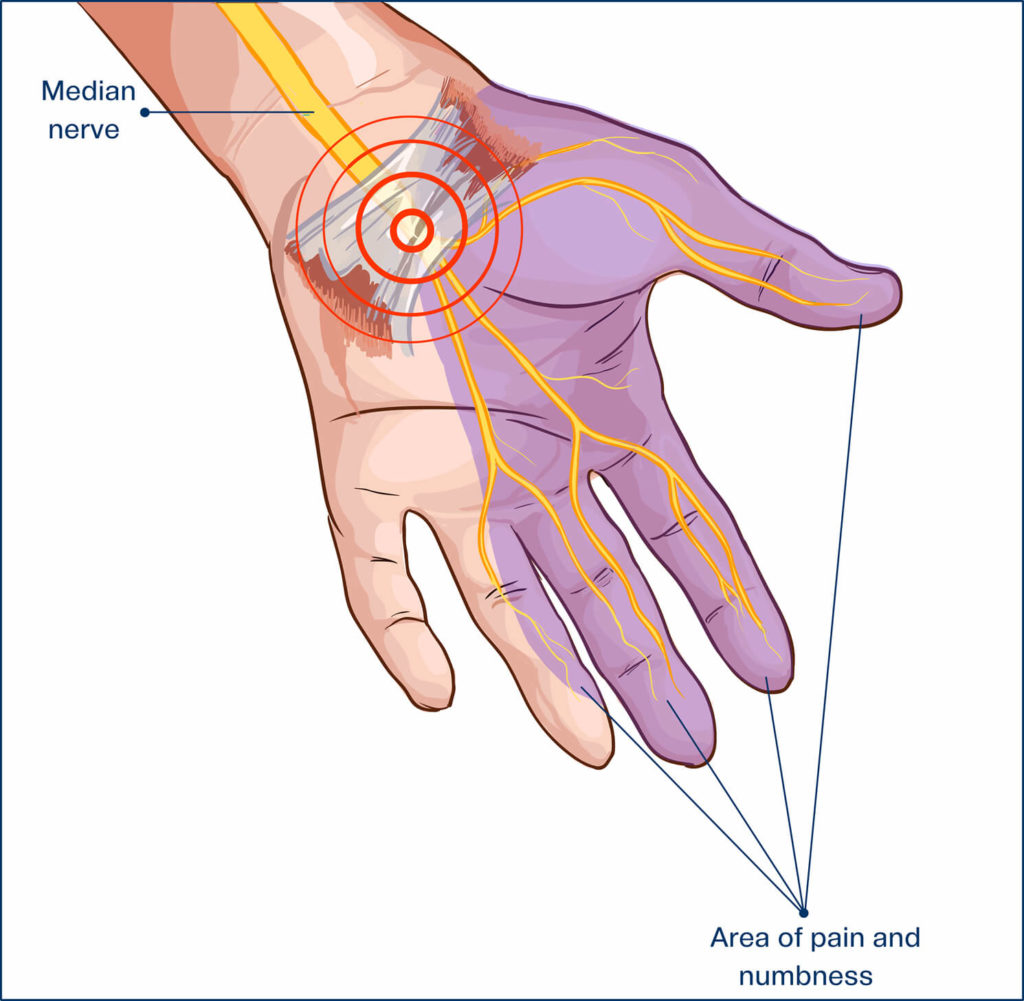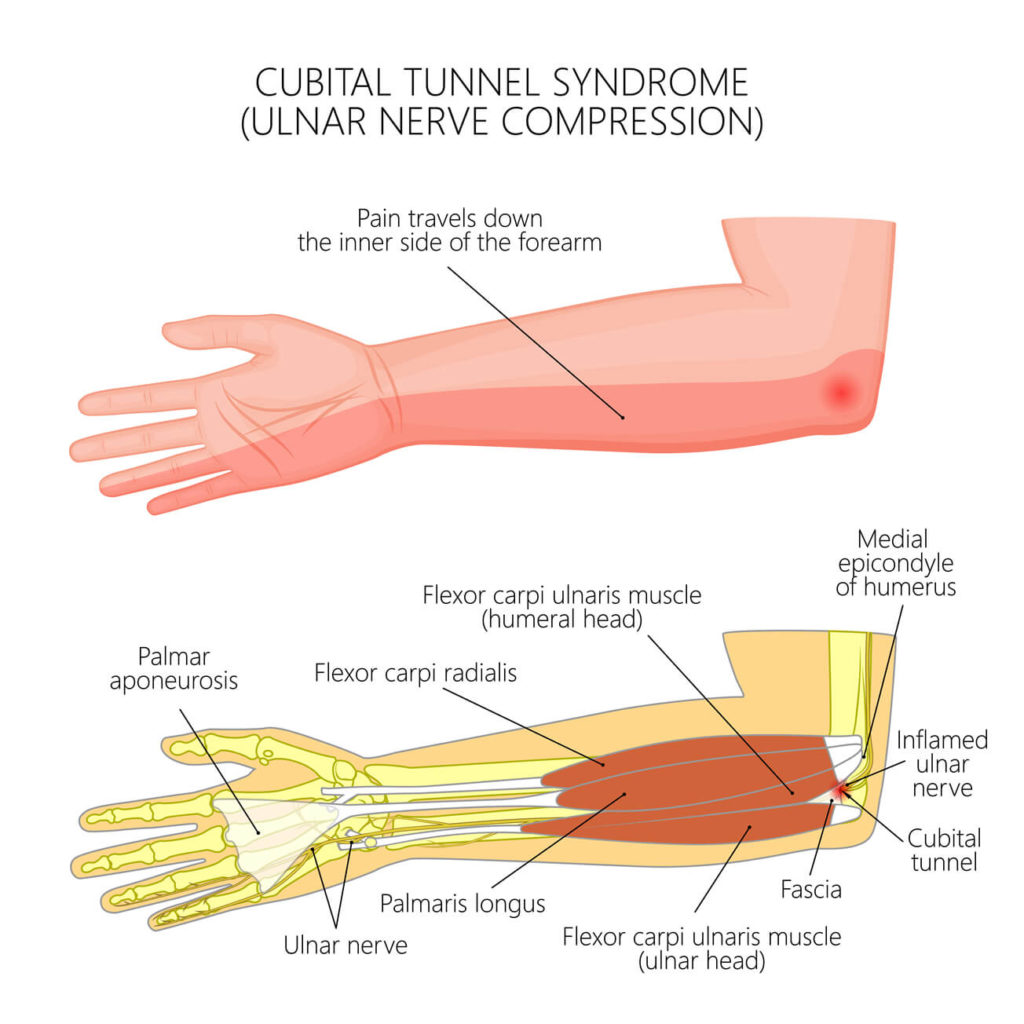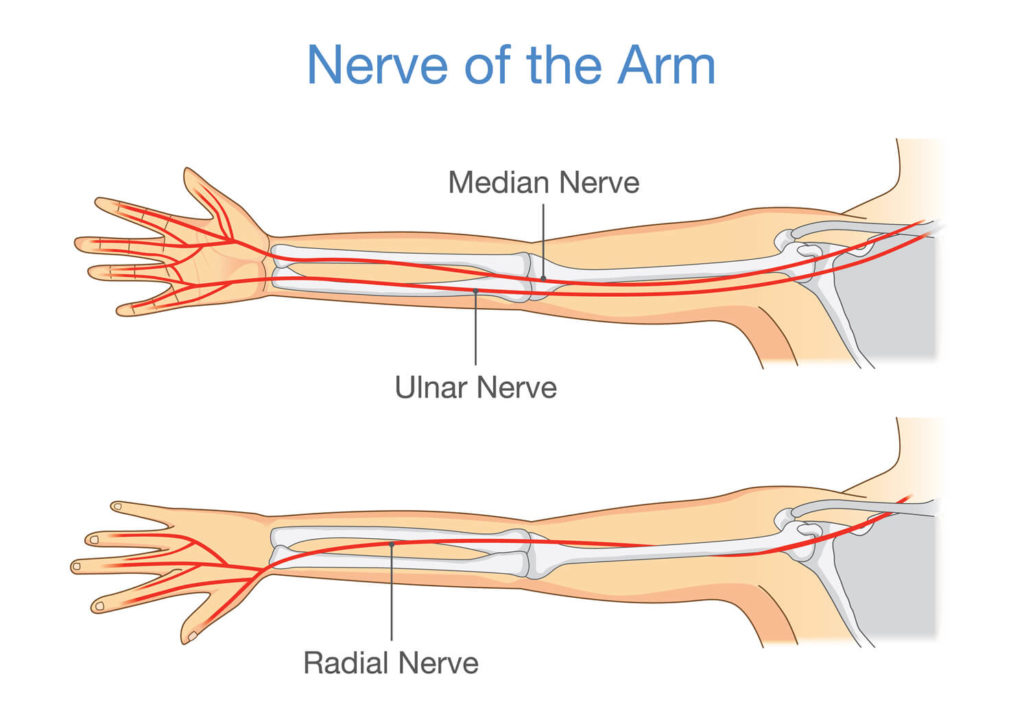Nerve Compression Conditions

Carpal Tunnel Syndrome (wrist) and Cubital Tunnel Syndrome (elbow) can cause pain, tingling, numbness, and/or muscle weakness affecting upper extremity function. These nerve compression conditions may be treated nonsurgically, but in more severe cases may require surgery and post-surgical therapy. At FORM Hand Therapy, our hand therapists provide highly specialized therapeutic interventions for the nonsurgical and post-surgical treatment of nerve compression conditions.
The following are just a few nerve compression conditions we treat.
- Carpal Tunnel Syndrome
- Cubital Tunnel Syndrome
- Radial Tunnel Syndrome
Carpal Tunnel Syndrome
Carpal Tunnel Syndrome is a condition where the median nerve is compressed as it enters the hand near the base of the palm. Symptoms can be brought on by repetitive or prolonged hand activity.

Symptoms
When the nerve is compressed, you may experience symptoms of numbness, tingling, pain, and weakness of the hand.
- Hand numbness or pain at night that can wake you up.
- Numbness when you first wake up in the morning.
- Symptoms may be intermittent or constant based on the severity of your condition.
Nonsurgical Treatment
If you are referred to FORM Ortho for the treatment of carpal tunnel syndrome, our hand therapists can help reduce your symptoms and prevent future carpal tunnel syndrome occurrences. Once the cause of your carpal tunnel syndrome is determined, your hand therapist may recommend wearing a brace during the day for activities that may irritate the median nerve, or at night to counteract the compression of the nerve that commonly occurs when the wrist is bent while sleeping. Our therapists can modify your daily activities, work tasks, and recreational activities to reduce your symptoms of carpal tunnel syndrome.
Post-Surgical Treatment
Hand therapists are also an integral part of recovery and rehabilitation following carpal tunnel release surgery. At FORM Ortho, our hand therapists can help you heal more quickly and achieve optimal functioning through soft tissue mobilization, assisted stretching and strength-building exercises throughout the course of therapy. We may also implement therapeutic modalities such as ultrasound, paraffin wax, and electrical stimulation.
Cubital Tunnel Syndrome
Cubital tunnel syndrome is a condition where the ulnar nerve gets compressed as it passes by the inner side of the elbow.

Symptoms
Symptoms can occur if the elbow is kept in a flexed position or by direct pressure on the inner side of the elbow.
- Hand numbness.
- Weakness of the hand.
- Pain around the elbow.
Nonsurgical Treatment
If you are referred to FORM Hand Therapy for nonsurgical treatment of cubital tunnel syndrome, our hand therapists will evaluate and determine what activities cause your symptoms and will make modifications to these activities. As part of your treatment, our hand therapists may provide you with nerve gliding and range of motion exercise programs, fitting for a padded elbow sleeve, or a custom splint to wear at night.
Post-Surgical Treatment
Should you need surgery, our hand therapists play an important role in your recovery and rehabilitation following cubital tunnel surgery. Our hand therapists design individualized programs for post-surgical therapy based on your operation and your surgeon’s recommendations. Activity modification is a big part of rehabilitation to prevent the recurrence of symptoms.
Radial Tunnel Syndrome
Radial tunnel syndrome is a nerve compression condition caused by increased pressure on the radial nerve, which runs by the bone and muscles of the forearm and elbow. Common causes include injury, noncancerous fatty tumors (lipomas), bone tumors, and inflammation of surrounding tissue.

Symptoms
Symptoms often include cutting, piercing, or stabbing pain at the top of the forearm or back of the hand, especially when you try to straighten your wrist and fingers. Unlike cubital tunnel syndrome or carpal tunnel syndrome, radial tunnel syndrome rarely causes numbness or tingling, because the radial nerve specifically affects the muscles.
Nonsurgical Treatment
If you are referred to FORM Ortho for nonsurgical treatment of radial tunnel syndrome, our hand therapists will evaluate and determine what activities cause your symptoms and will make modifications to these activities. As part of your conservative treatment, our hand therapists may provide you with wrist and/or elbow splints to reduce irritation of the radial nerve, and they will devise exercises to help reduce the effects of repetitive motion stress.
Post-Surgical Treatment
Should you need surgery, our hand therapists play an important role in your recovery and rehabilitation following radial tunnel surgery. Our hand therapists design individualized programs for post-surgical therapy based on your operation and your surgeon’s recommendations. Activity modification is a big part of rehabilitation to prevent the recurrence of symptoms, as well as the use of ice packs, soft-tissue massage, and stretching to improve patients’ range of motion. After 6 weeks, patients begin strength-building exercises for the forearm and hand, and then gradually our hand therapists will add exercises to stabilize and strengthen the wrist, elbow, and shoulder and improve fine motor control in the hand.
Contact Us
If you have a question about whether your condition should be treated by one of our hand therapists, call FORM Hand Therapy at (510) 350-3030. If you are not currently under the care of a physician for your condition or would like to be evaluated by an Orthopedic Surgeon specializing in hand, wrist, and elbow conditions, request an appointment at FORM Hand Therapy.
